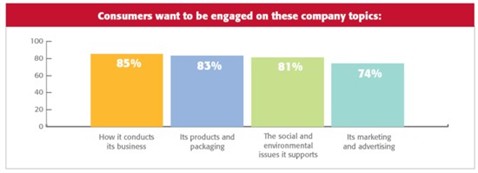Companies Failing To Engage Consumers
Americans believe their ideas can help companies create products
and services that are a win for consumers, business and society;
yet, only half (53%) feel companies are effectively encouraging
them to speak up on corporate social and environmental practices
and products, according to the 2010 Cone Shared Responsibility
Study.
A majority of consumers want to be engaged on four key responsible
business pillars, including how a company conducts its business
(85%), its products and packaging (83%), its support of social and
environmental issues (81%) and its marketing and advertising (74%).
Consumers are prepared to dedicate time and money to help influence
corporate social/environmental practices through surveys and
research (70%), buying or boycotting a company’s products (44%) or
through email, phone or employee communications (32%), among other
activities.

Yet, when it comes to consumer interaction, most Americans say
companies are not making the grade. Three-quarters assign companies
a “C,” “D,” or “F” on how well they are engaging consumers around
critical business issues. This disconnect signals a lost
opportunity for companies because consumers are prepared to reward
them for engagement. If a company incorporated their ideas,
consumers say they would be more likely to buy its products and
services (60%), more loyal (54%) and more likely to recommend the
company (51%).
“There’s tremendous opportunity to more actively
collaborate with consumers and other key stakeholders to achieve
mutually beneficial solutions,” says Jonathan Yohannan, senior vice
president of Cone.
“We call this collaborative approach
to addressing social and environmental issues ‘Shared
Responsibility’ because diverse stakeholders each have a unique
value, role and stake in solving today’s complex global challenges.
Companies can’t go it alone.”
Consumers Hold Great Expectations
Americans are holding companies accountable for addressing a range
of complex, global issues that may directly or indirectly touch
their businesses, from ensuring product quality and safety (92%) to
alleviating poverty (62%).
The range of issues is complemented by an equally extensive menu of
business approaches to solve them. Consumers indicate everything
from developing new products and services (89%) to making
charitable donations (83%) are effective ways for a company to help
solve social and environmental issues.

“Companies have a unique opportunity to address issues
holistically, from the products they create to the partnerships
they form to the dollars they give,” says Alison DaSilva, executive
vice president of Cone. “And it’s this blend of both social
initiatives and business operations - along with the sweat equity
and ingenuity of diverse stakeholders - that stands to affect
change. We all share responsibility for the issues at hand, and we
all stand to benefit from the solutions.”
Transparent Communication Core to Building
Trust
Not only do consumers want a voice in the issues, but they are
overwhelmingly prepared to listen. A full 92 percent want companies
to tell them what they’re doing to improve their products, services
and operations. But two key barriers exist:
Skepticism - 87
percent of consumers believe the communication is one-sided -
companies share the positive information about their efforts, but
withhold the negative; and,
Confusion - 67 percent of consumers are confused
by the messages companies use to talk about their social and
environmental commitments.
“Open, consistent lines of communication are the only way a
company can effectively collaborate with diverse stakeholders for
the long-term and stay on top of issues that may improve or inhibit
its business,” says Yohannan. “It doesn’t mean companies have to
solve all of the issues on the table, but it does mean being
transparent about their journey.”
About the Study:
The 2010 Cone Shared Responsibility Study presents the findings
of an online survey conducted April 8-9, 2010 by Opinion Research
Corporation (ORC) among a representative U.S. sample of 1,045
adults comprising 507 men and 538 women 18 years of age and older.
The margin of error associated with a sample of this size is ±
3%.
Source: www.coneinc.com

